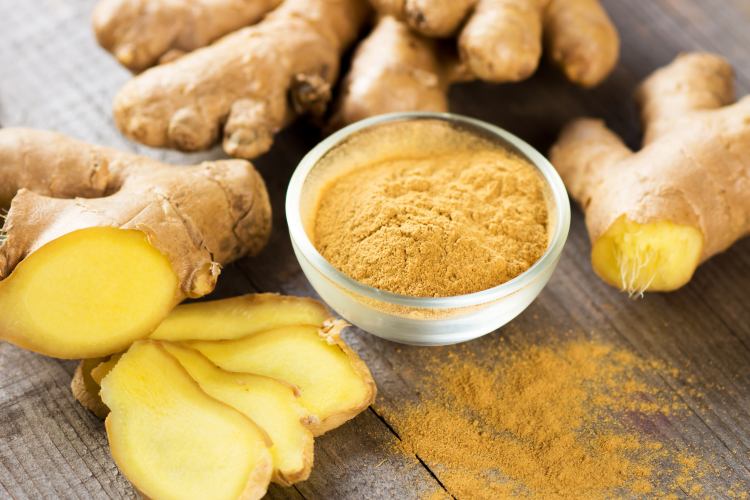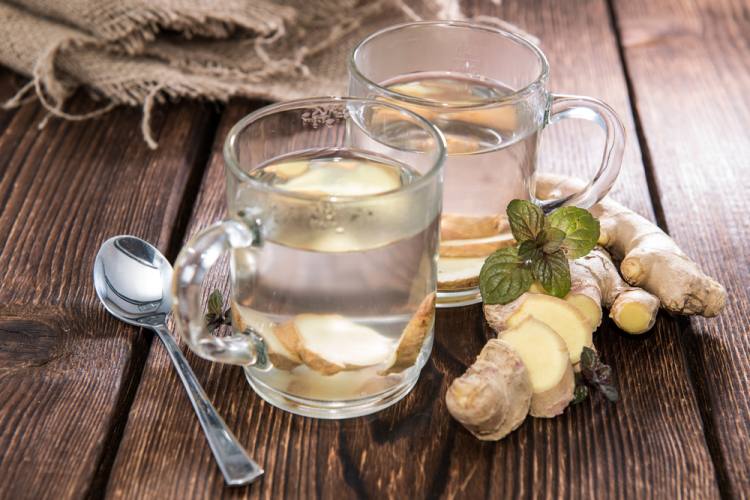Ginger for Diabetes: Is It Really Safe and Good?
For thousands of years, people have been using ginger as a natural remedy for various diseases. But what about ginger and diabetes? Does taking ginger for diabetes have any real benefits? What are the effects of ginger on blood sugar levels? And how does ginger interact with diabetes medications? Is it safe or not? Here is an evidence-based article taking a detailed look at benefits and risks associated with the use of ginger for the treatment of diabetes.
Ginger and its nutrition profile
Ginger is a spice obtained from rhizomes (underground parts of the stem) of Zingiber officinale plant.
Due to its antibacterial and anti-inflammatory effects, people in India and China have been using it as a natural remedy for many diseases, including nausea, morning sickness, motion sickness, Alzheimer's disease, flu, and cold for over 3,000 years (1, 2).
Besides, it also reduces cholesterol, helps in weight loss and stimulates blood circulation (3, 4, 5)
Allegedly, it may also slow down the growth of tumor (cancer) cells.
Ginger contains some bioactive plant substances, the most important of which is gingerol.
This molecule is responsible for most anti-inflammatory, antioxidant and antidiabetic effects of ginger.
There are many ways to eat ginger. You may use it as a spice or food ingredient, make some ginger tea or buy some ginger powder, oil or juice in your local pharmacy or specialized stores.
Cosmetic manufacturers also add ginger to beauty products.
Many people think that the edible part of ginger is its root, but it is not true. The piece of the Zingiber officinale plant used in medicine is called rhizome, which is an underground section of the stem.
Antidiabetic effects of ginger
New research suggests that ginger may have strong antidiabetic effects. Ginger has a positive impact not only on diabetes itself, but it may also help in the treatment of complications associated with diabetes.
Effects of ginger on diabetes and blood sugar levels
In 2015, a double-blind, placebo-controlled trial was conducted involving 41 participants with type 2 diabetes (6).
The results were impressive.
Study participants who took 2 grams of ginger powder daily for 12 weeks had a 12% lower blood sugar than those who did not eat ginger powder.
Additionally, glycated hemoglobin (HbA1c) decreased by 10% in patients receiving ginger after 12 weeks.

Ginger has strong antidiabetic effects
Glycated (glycosylated) hemoglobin (HbA1c) is an essential indicator of long-term blood sugar levels, and its 10% reduction is significant for diabetics.
Another study, published in 2012 in the prestigious Planta Medica magazine, suggests that ginger may help lower blood sugar by improving the distribution of GLUT 4 glucose transporters on the surface of muscle cells (7, 8)
More GLUT 4 transporters lead to better utilization of glucose by muscle cells, which translates into better blood sugar control.
However, ginger may also help in the management of type 1 diabetes, which is associated with a critical insulin deficiency due to the damage of pancreatic cells caused most often by an autoimmune disease.
Animal studies suggest that ginger ethanol extract significantly reduces fasting blood glucose (9).
Laboratory rats with type 1 diabetes took 800 mg/kg of ginger ethanol extract.
On average, their blood sugar level went down by 24 to 53% in 4 hours.
Another study suggests that one dose of ginger juice can prevent acute hyperglycemia induced by serotonin 5-HT receptors in type 1 diabetic rats (10).
Long-term use of ginger not only lowers blood glucose levels but also increases insulin release and reduces cardiovascular disease risk factors, such as total cholesterol and triglycerides in type 1 diabetes rats (11, 12).
Effects of ginger on diabetic complications
Ginger can also be used to prevent complications of diabetes.
Animal studies indicate that ginger ethanol extract helps reduce triglycerides and cholesterol in the liver.
What is more, ginger may relieve inflammation and reduce levels of inflammatory markers in the liver, such as IL-6 or TNF alpha (13).
Ginger also blocks the activity of oxidative enzymes and prevents liver and kidney damage (14).
In people with hyperglycemia (a disease caused by excess blood sugar) glucose is converted into sorbitol and fructose. Accumulation of these substances increases the risk of cataracts.
Phytochemicals contained in ginger reduce the activity of the enzyme that breaks down glucose into sorbitol and fructose (aldose reductase), thereby reducing the risk of cataracts (15).
Ginger also has neuroprotective effects and protects the brain from damage. As such, it can be used to prevent neurodegenerative diseases such as Alzheimer's disease (16).
Although the research results are promising, we need to carry out more placebo-controlled studies before we can make any specific recommendations for the use of ginger for diabetes.
Other health benefits of ginger
In addition to antidiabetic effects, ginger also has many other benefits for your health.
It is used, for example, in the treatment of dyspepsia, a common disorder associated with stomach pain after eating.
Ginger accelerates stomach emptying to alleviate the symptoms of dyspepsia (17, 18).
Ginger may also be a useful remedy for various types of nausea, including morning sickness in pregnancy, post-operative nausea (vomiting and nausea after surgery) or motion sickness (kinetosis) (19, 20, 21).
Ginger powder also relieves menstrual pain and joint pain associated with osteoarthritis (22, 23).
Last but not least, ginger improves the lipid profile (24).
It lowers blood levels of LDL cholesterol, triglycerides and total cholesterol and helps protect against cardiovascular diseases.
Some studies also indicate that fresh ginger protects against cancer and slows down the growth of tumor cells (25, 26).
However, more research is necessary as some studies did not find any anti-cancer properties of ginger (27).
Last but not least, ginger has neuroprotective effects and protects against Alzheimer's disease (28).
How to take ginger for diabetes?
Most studies that look at the effects of ginger on diabetes and its complications use either ginger powder or ginger oil or alcohol extracts.
These products contain the highest amount of gingerol and are the most effective.
The problem is that ginger has a strong, pungent taste and some people may find it very difficult to swallow raw, fresh ginger powder.
What is more, freshly grated ginger can harm and burn your digestive tract.
In such case, you may either try ginger oils or extracts or consume ginger in your tea or with your meals (just season your meal with some ground ginger powder).
How to make ginger tea for diabetes?
Here's an easy recipe for ginger tea for diabetics.
First peel and grate ginger rhizome (or cut it into small slices).
Pour hot water over the grated or chopped ginger (0.5 liters of water per each 1/2 inch (1 cm) ginger rhizome piece).

Ginger tea may help lower blood sugar levels
Leach for 15 minutes.
Strain the tea, add lemon or orange juice to taste and season with cinnamon and cloves. Sweeten with honey.
Drink the ginger lemon tea either warm or let it cool down and drink cold as a refreshing summer drink.
Side effects of ginger
If you do not exceed the daily threshold amount of ginger (5 grams), the side effects are rare.
In higher doses, ginger may cause heartburn, diarrhea, oral cavity irritation, stomach upset, bleeding (such as heavy menstrual bleeding).
When using ginger in the treatment of diabetes, it is necessary to pay close attention to interactions with some medicines.
Because ginger lowers blood sugar, it may cause hypoglycemia (excessive decrease in blood sugar) if taken with oral antidiabetics (such as metformin, pioglitazone, glipizide, tolbutamide, etc.) or other diabetic medicines (such as insulin, etc.).
Hypoglycemia is dangerous because you may faint and die without urgent medical help.
If you have diabetes, always consult your doctor before taking any ginger (even before drinking ginger tea) and continuously measure your blood sugar levels.
Ginger may also interact with some anti-platelet drugs that slow down blood clotting (such as diclofenac, clopidogrel, aspirin, naproxen, enoxaparin, heparin, warfarin, phenprocoumon).
Ginger also interacts with high blood pressure medications (especially calcium channel blockers), such as verapamil, nifedipine, felodipine, amlodipine, etc.
Side effects of ginger in pregnant and breastfeeding women are still being investigated.
Ginger can be a useful cure for morning sickness, but some experts warn that it may cause miscarriage (abortion) or harm the fetus (unborn child) if taken in large quantities.
You should therefore always consult your doctor about the use of ginger in pregnancy and breastfeeding.
FAQs
Here are the frequently asked questions of people who take ginger for diabetes.
Can I take ginger with metformin?
Ginger, like metformin, reduces sugar in the blood, which can lead to life-threatening hypoglycemia. If you are taking metformin or other medicines for diabetes, talk to your doctor before taking ginger.
Is ginger beer good for diabetics?
Ginger beer (ale) is an alcoholic drink that is not suitable for people with diabetes. Besides, ginger beer contains very little ginger, so its effects will be mild.
If you drink one ginger ale once in a while, it will not harm you, but its regular consumption is not recommended.
Is ginger for diabetes good and safe?
Ginger lowers blood sugar, promotes insulin release and has positive effects on other risk factors of diabetes and insulin resistance.
However, it may interact with some medicines used to treat diabetes (such as metformin) and increase their efficiency, which can be dangerous.
We do not recommend taking any ginger supplements (powder, extracts, oils, tablets, etc.) or drink ginger tea for diabetes without a prior consent of your doctor.
Diabetes requires proper evidence-based treatment and natural medicines, such as ginger, should not be taken as a substitute for regular medications.
Although many people believe that natural medicines cannot harm you, it's not true. Even natural substances may reduce (or increase) the effects of other medications you take or make your symptoms worse.
| Written by: | Michal Vilímovský (EN) |
|---|---|
| Education: | Physician |
| Article resources: | See numbered references in the article |
| Image resources: | Stockphotosecrets.com |
| Published: | April 4, 2018 at 6:40 PM |
| Next scheduled update: | April 4, 2020 at 6:40 PM |
Get more articles like this in your inbox
Sign up for our daily mail and get the best evidence based health, nutrition and beauty articles on the web.


Ache in left arm that you should not ignore
Alkaline water dangers: why you should not drink it
How to Avoid Sleepiness While Studying?
23 Foods That Increase Leptin Sensitivity
Low dopamine (e.g. dopamine deficiency): causes, symptoms, diagnosis and treatment options
Swollen taste buds: the ultimate guide to causes, symptoms and treatment
Thin endometrial lining: causes, symptoms, diagnosis and treatment
Pimples inside nose: the complete guide
Holes in tonsils: definition, symptoms, treatment and prevention
How to deal with an ingrown hair cyst
Allegra vs. Zyrtec vs. Claritin
Allergy to penicillin and alternative antibiotics
How to get rid of phlegm (excessive mucus) in throat? Detailed guide to medical and home remedies, symptoms and causes
What causes stomach ache after meals?
Liver blood test results explained